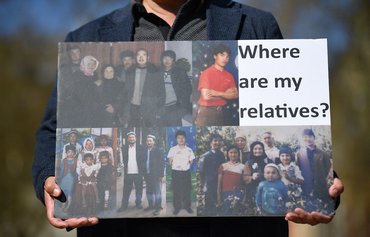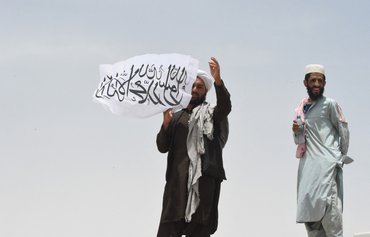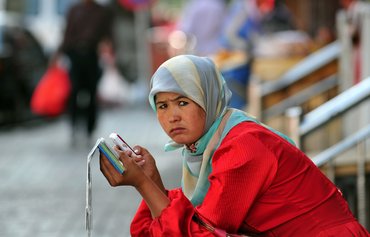Iran claims to champion Muslim rights in the Middle East and around the world. But the recent strategic pact that Tehran and Beijing have agreed to lays bare the Islamic Republic's hypocrisy, observers told Al-Mashareq.
The Chinese government's brutal treatment of the Uighurs -- a Muslim ethnic minority based in Xinjiang province -- has been widely reported by dozens of credible international media outlets.
There are accounts of a woman detained in her home by Chinese forces because of her religion, later placed in an internment camp; and of a woman who faced the same fate as she had a third child -- one more than the law allows.
The Chinese government destroyed a mosque a group of Uighurs attended and built a public toilet in its place, apparently to humiliate the community.
It has forced invasive methods of birth control on Uighur women, and has even sterilised them; and there also have been reports of organ harvesting. Uighurs who dare to speak about their situation have been tortured and killed.
China's political and religious repression of its Uighur population has been going on for the better part of the last decade, but has intensified over the past year, observers familiar with the situation told Al-Mashareq.
Beijing's ultimate goal is to wipe out Uighur culture and religion, they said.
Iran, China pact
Iran recently negotiated a 25-year strategic pact with China, which is expected to be formalised soon, according to media reports.
This is the same China that has systematically destroyed dozens of Muslim holy sites, including Imam Asim shrine, revered by devout Uighurs, observers said.
Although there is undeniable evidence that Beijing is actively engaged in efforts to wipe out an entire culture, the Islamic Republic government looks the other way, they noted, while signing a deal to effectively give away Iran's oil.
Under the terms of the deal, Iran would be selling its oil to China at rock-bottom prices for 25 years, in exchange for the mere promise that China would invest $400 billion in Iran's economy over the next two to three decades.
Since the details of the deal have come to light, reaction to it has been overwhelmingly negative and critical. A small number of observers, however, have said $400 billion is a large sum of money which Iran needs.
China boosting Iran a 'fantasy'
A prominent US-based Iranian journalist who asked that his name be withheld said Iranian officials "mistakenly believe" the pact with China will help balance US pressure on Tehran, providing it with capital injection and technology.
"It is a fantasy," he told Al-Mashareq. "In fact, when it came to [international] sanctions against Iran a decade ago, China did not hesitate to vote with the US to impose them on Iran."
The Islamic Revolutionary Guard Corps (IRGC) is a big supporter of the deal with China, he said, because it hopes to buy missiles from that country, so it can reverse engineer them and improve its own weaponry.
Ali Motahari is an outspoken former legislator who was barred from running for re-election. On August 5th, he expressed concerns about Iran's plan to go ahead with the deal despite China's treatment of the Uighurs.
"A senior official at [Iran's] foreign ministry told me Iran is remaining silent because it is economically dependent on China," Motahari said.
'Interest above religion'
Though it styles itself as the Islamic Republic, Iran takes action based on its interests rather than religion, political activist and al-Muwatana party leader Ghaith al-Tamimi told Al-Mashareq.
This is evident from its dual stances towards human rights issues in the region and in the countries of the world, he said.
Al-Tamimi, a former cleric at Iraq's Najaf seminary, said, "On the one hand, Iran shows great interest in the rights of Palestinians, for instance, and on the other, it ignores the rights of the Muslim communities of China and Myanmar."
The Iranian regime oppresses its own people and denies them their rights while provoking internal conflict outside its borders, he added.
It exploits religion as a cover to push its agenda forward, while in reality, it does not have any interest in human rights or international conventions, he said.
Faris al-Omran contributed to this report.

![Iranian president Hassan Rouhani is seen here with his Chinese counterpart Xi Jinping. [Photo via Tejarat News]](/cnmi_am/images/2020/08/28/25735-Iran-Rouhani-Xi-600_384.jpg)







Iran considers Sunnis to be its enemies, and therefore, it won’t care if Sunni Muslims are killed by it or by others.
Reply1 Comment(s)